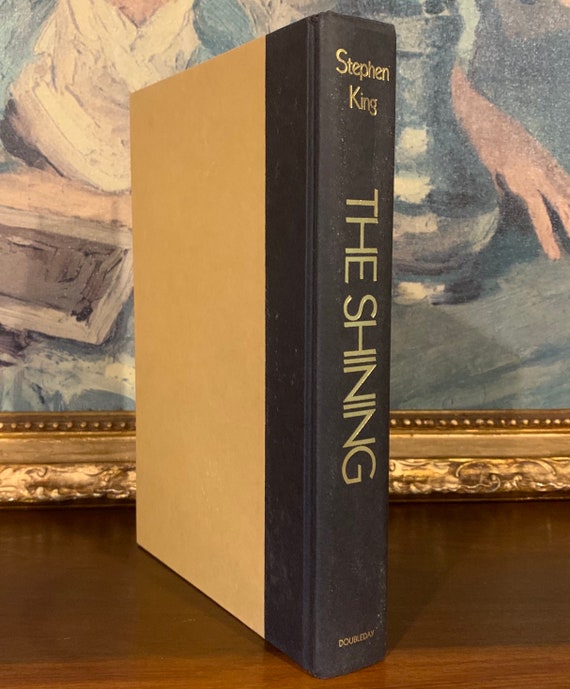Stephen King's *The Shining*: A Deep Dive into the Masterpiece of Horror

Stephen King’s The Shining, a cornerstone of modern horror literature, transcends the typical haunted house narrative to explore the depths of human psychology, the destructive nature of addiction, and the fragility of family bonds. Published in 1977, the novel has captivated readers for decades, inspiring a celebrated (though controversial) film adaptation by Stanley Kubrick and a more recent miniseries. This exploration delves into the book’s themes, literary context, cultural impact, and its relationship to its various adaptations, drawing upon insights from Goodreads reviews and other online resources.

A Family Under Siege: Exploring the Themes of The Shining
At its core, The Shining is a chilling family drama interwoven with supernatural elements. The story centers on Jack Torrance, a recovering alcoholic and aspiring writer who accepts a winter caretaker position at the isolated Overlook Hotel in the Colorado Rockies. He brings his wife, Wendy, and their young son, Danny, hoping for a fresh start and a chance to reconnect as a family. However, the Overlook, steeped in a history of violence and tragedy, exerts a malevolent influence, preying on Jack’s vulnerabilities and threatening the family’s very existence.
The novel masterfully explores the destructive power of addiction. Jack’s alcoholism isn’t merely a plot device; it’s a driving force behind his descent into madness. King vividly portrays Jack’s internal struggle, his desperate cravings, and the agonizing physical and psychological symptoms of withdrawal. This realistic portrayal resonates deeply, adding layers of horror that extend beyond the supernatural. The novel doesn’t shy away from depicting the impact of Jack’s addiction on his family, highlighting the fear and instability experienced by Wendy and Danny. Wendy’s own past trauma and her dependence on Jack further complicate their relationship, making the family dynamic a central source of tension and conflict.

Danny, the youngest member of the family, possesses “the shining,” a form of extrasensory perception that allows him to see into the past and future, communicate telepathically, and sense the malevolent forces at play within the Overlook. His “shine” is both a gift and a curse, exposing him to horrifying visions and making him a target for the hotel’s sinister energy. Danny’s innocence and vulnerability serve as a powerful contrast to the adults’ struggles, amplifying the emotional stakes of the story.
The Overlook Hotel: A Character in Itself
The Overlook Hotel isn’t just a setting; it’s a character in its own right, a sentient entity that feeds on the darkness of its past and seeks to corrupt those within its walls. King’s descriptions create a palpable sense of unease and dread. The decaying grandeur of the hotel, the unsettling sounds and apparitions, and the disturbing history all contribute to the pervasive atmosphere of menace. The hotel’s influence is not immediate; it slowly corrupts Jack, exploiting his pre-existing vulnerabilities to push him towards violence and destruction. This slow, insidious influence is one of the most terrifying aspects of the novel.

Literary Context and Inspirations
King’s The Shining is rich with literary allusions and references, reflecting his deep engagement with the horror genre and its literary predecessors. The novel explicitly draws inspiration from Edgar Allan Poe’s “The Masque of the Red Death,” with the Overlook Hotel’s history of lavish parties and hidden horrors mirroring Poe’s tale of a plague-ridden masquerade. Other influences include Shirley Jackson’s The Haunting of Hill House and Horace Walpole’s The Castle of Otranto, both of which explore themes of haunted houses and psychological torment. King also weaves in allusions to works by various authors, including Frank Norris, underscoring the literary lineage of his own work.
Stephen King’s Writing Style and Authorial Voice
King’s distinctive writing style is central to the novel’s impact. His prose is characterized by its accessibility, directness, and ability to build suspense through vivid descriptions and psychological detail. He effectively uses a third-person limited perspective, allowing readers to experience the story through the eyes of multiple characters, deepening the emotional resonance and adding layers of suspense. The shift between the perspectives of Jack, Wendy, and Danny allows King to control the pace and reveal information strategically, maximizing the impact of the story’s suspense and horror. King’s masterful use of imagery and figurative language creates a vivid and haunting atmosphere, transforming the Overlook Hotel into a physical manifestation of Jack’s internal turmoil. His descriptions are often stark and visceral, evoking the physical sensations of fear and anxiety. King’s conversational tone creates an intimacy that draws readers into the story’s emotional core.
Adaptations and Cultural Impact
The Shining has had a significant cultural impact, inspiring numerous adaptations and discussions about the nature of horror and the human psyche. Stanley Kubrick’s 1980 film adaptation, while drastically diverging from the novel in its plot and characterizations, remains an iconic and influential work of cinematic horror, known for its chilling visuals and unsettling atmosphere. The film’s interpretation of Jack Torrance, played by Jack Nicholson, has become synonymous with the character, even overshadowing King’s original portrayal. The 1997 miniseries adaptation, however, remains truer to the novel’s plot and themes, offering a different but equally compelling interpretation.
The differences between the novel and Kubrick’s film have fueled ongoing debate and analysis. While the film emphasizes the supernatural aspects of the story, the novel delves more deeply into the psychological struggles of the characters, particularly Jack’s alcoholism and the breakdown of the family unit. This difference underscores the novel’s power to move beyond typical genre conventions and tackle complex themes with nuance and depth. The novel’s exploration of addiction, domestic violence, and the psychological impact of trauma has resonated with readers, solidifying its position as a powerful and enduring work of literature.
The Legacy of The Shining: Literary Influence and Awards
The Shining is widely regarded as one of Stephen King’s finest works and a significant contribution to the horror genre. It has received numerous accolades, and its influence can be seen in subsequent horror novels and films. Its exploration of psychological horror, its complex characters, and its masterful creation of atmosphere continue to inspire writers and filmmakers. The novel’s lasting impact is a testament to King’s enduring power as a storyteller and his ability to connect with readers on both a visceral and intellectual level. The novel’s success and enduring popularity, as evidenced by its ongoing presence on bestseller lists and its high ranking on Goodreads, attest to its powerful storytelling and its lasting impact on readers.
The Shining and the Goodreads Community
Goodreads reviews consistently highlight The Shining’s effectiveness as a horror story and a compelling exploration of family dynamics and the consequences of addiction. Many reviewers praise King’s character development, describing the Torrances as complex and relatable figures, even amidst the escalating supernatural horror. Reviewers emphasize the power of the Overlook Hotel as a character, its oppressive atmosphere, and its gradual corruption of Jack Torrance. The differences between the novel and the Kubrick film adaptation are frequently discussed, with many reviewers preferring the novel’s deeper psychological exploration and more nuanced characterizations. Some readers find the novel’s pacing slow in its initial sections; however, this slow build-up of tension is seen by many as a crucial component of the narrative’s power.
A Diverse Reading Experience: Contrasting Perspectives on The Shining
The Goodreads reviews showcase the diverse ways readers engage with The Shining. While some readers emphasize the novel’s visceral horror and its ability to evoke feelings of unease and fear, others focus on its character-driven aspects, its exploration of family dynamics, and its psychological depth. This diversity of interpretations reflects the novel’s multifaceted nature and its ability to resonate with readers on multiple levels. Some reviewers highlight the novel’s social commentary on addiction and family trauma, while others are impressed by its literary style and its skillful use of symbolism and metaphor. The varying perspectives on the film adaptation, too, are reflected in these reviews. Some readers appreciate Kubrick’s stylistic choices while others lament the deviations from King’s original vision.
Conclusion: The Enduring Power of The Shining
Stephen King’s The Shining remains a powerful and influential work of horror literature, seamlessly blending elements of the supernatural with the profoundly human experience. The novel’s enduring appeal stems not only from its ability to evoke visceral fear and suspense but also from its deep exploration of family relationships, the destructive consequences of addiction, and the complexities of the human psyche. Its enduring presence in popular culture, its continued influence on subsequent horror works, and the depth of engagement it inspires amongst readers underscore its status as a true classic of the genre. The novel’s enduring legacy is a testament to Stephen King’s masterful storytelling and his unique ability to combine the terrifying with the deeply human, leaving a lasting impression on readers and critics alike.